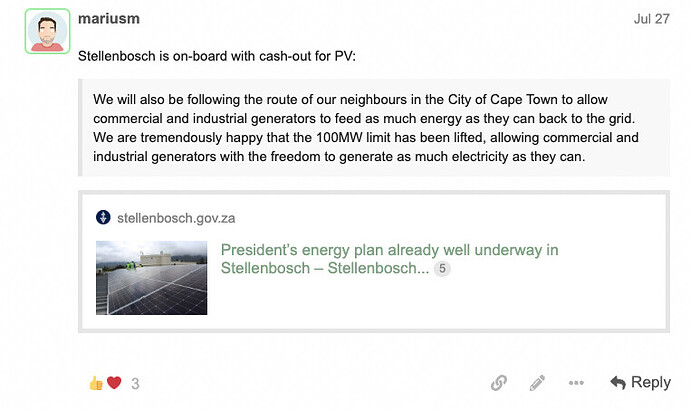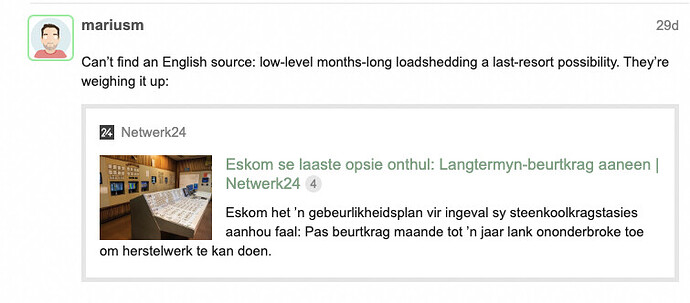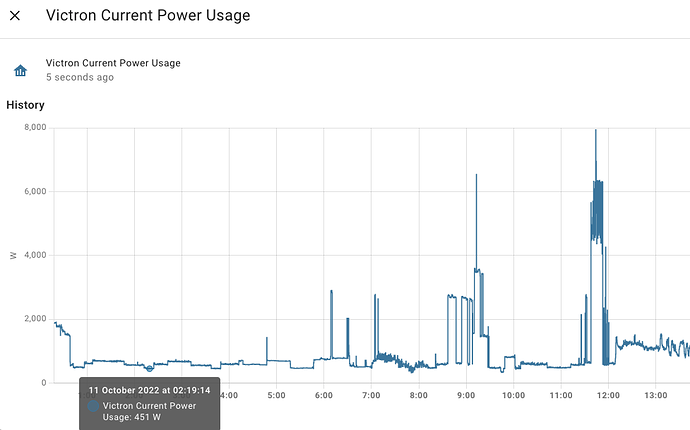PS: This was posted on another local forum and it struck me due to it’s clarity and his ability to analyse the big picture of the issues confronting the beginner:
https://www.4x4community.co.za/forum/showthread.php/359639-Things-I-learned-by-installing-solar
Nice review. Tiny bit of writer’s criticism: I think you may be missing an “h” at the end of your battery capacity figures (ie 10kWh, not 10kW) ![]()
I had a lekker laugh for some responds on the “other” forum.
Sure!
Remember this isn’t my post! I copied it from 4x4 Community (I trust there isn’t a copyright issue ![]() )
)
I didn’t realise it wasn’t yours. It sounds like it is… so I think it is best to link the original to make it clear. Basically move your “PS” to the top and link the original, then it is perfect.
Or put the contents of the post in quotes by wrapping it in [ quote ] post [ /quote ] (without the spaces on the inside of the brackets)
@Richard_Mackay Please create a link to the post (with a context statement) and delete the whole post. There are copywrite issues and also our forum rules need to be applied here!
On the subject of posting interesting threads I find little sharing is being done.
Members tend to stick to their forum and don’t venture further (unless they are all using multiple aliases)
Our SA community is not so big and local conditions are pivotal so this is a waste IMHO…
Posting links I find isn’t effective. Members don’t click on them… ![]()
If there is an interest, they will click.
Flipside, very long posts are not read unless it is of interest.
The true beneficiaries, the majority, mostly just read, seldom if ever posting anything.
I’m just chaffed that Victron is now mentioned more there than ever before. ![]()
There isn’t another way - rights need to be protected and the risk of litigation avoided, at all costs.
@Richard_Mackay I think if you write a short piece saying why you found this link interesting, and why you think it is worth sharing, that would help a lot.
Your previous “link posts” are almost always without context, and sometimes to subscriber-only content.
You’re right that people don’t just click random links without an incentive to do so, so give them a taste. I try to copy the standout paragraph or two (in my opinion) and then link the post. Sometimes a whole 5x people click them!
Eg:
I think this shows that I found it interesting enough to distill what stood out to me – I did a little bit of work to make it easy to digest, I don’t expect them to blindly click a link which may be worthwhile, but probably isn’t. Most people that saw these two examples saw what I wanted them to see from the post itself, and didn’t click through. That’s fine.
And if someone disagrees, or is interested in more detail, they can go look at the source.
I think I am different yo everybody else because I like the size of inverter and battery I installed and I don’t want to go bigger.
But I started from their point 5.
So my 5 points would be:
- Don’t try do go off grid.
- Get a goal of why you want to install solar
- Stick to that goal from point 2. If you want/need/must have extra, measure that against your goal. If it does not fit the goal either do not get it or you must adjust your goal.
- Spec your system/install for winter sun
- Get the inverter size that fit 80% of your usage, get PV for the same size, get battery that is 2x to 3x that. So in my case this will be 3kW inverter, 3kW PV, 10kWh batteries.
After that, chill and enjoy it ![]()
Sometimes I feel that this is the hardest part ![]()
My 2c
My main goal back in 2013 was to not lose money (due to lost productivity) when the power is off. It cost me about 20k back then, but in that plan I succeeded in every way possible.
Then came the slow creep upwards… but right now I’m there again, beginning to think that I really should upgrade from 3kW to 5kW…
I don’t need to… ![]()
5kva (4kw), 5.2kw, 14kWh.
I’m done … ok, maybe I want 3 more cells. ![]()
I was “forced” to upgrade from 3kva to 5kva due to temp derating on the 3kva.
However, not one days regret. I can “looi” the 4kw now with ease.
What a nice tongue-in-cheek article.
The part that grabbed my attention though, I quote: “What’s worse is that some inverters, such as certain models of Growatt, have warranties that are voided in the event of the inverter being overloaded.”
I read that article and a few things really bothered me.
The first is his initial energy use of a whopping 60kWh. He turns one geyser off and immediately saves 20kWh a day. What!? That’s around 400 liters of hot water that was apparently no longer needed. Someone went “oh well, fine, I guess I’ll stop taking those long showers”. Or something. That part made no sense at all.
Then there is the wrong energy unit for the battery thing that makes my left eye twitch…
And somehow he has the idea that cycling the battery to 50% twice a day helps with longevity. Rather, keeping it around 80% and only fully charging (to resync SOC and balance) weekly will help, a little, constant cycling doesn’t really help…
But that “turn off a geyser and save 20kWh and nobody complains” bit… how did he do that! Or was it some old geyser that was just pumping heat into the atmosphere for farts and giggles? That’s some Deus ex machina stuff right there…
Interesting who sees what. I skip over the teeny typos, some cannot, as it is wrong. Some could get distracted from the core message.
I read your post and a few things really bothered me. ![]()
It seems it is from a female writer, Sukasha Singh?
The 60kwh, dropping 20kwh, the stroppy septuagenarian comes to mind. Slow showers, maybe more than one per day, we don’t know.
And 3 x 200-liter geysers with 4kw elements, down to 2 AND them being on 2kw elements AND on timers AND probably dropped the temp too?
= maybe the “immediately saved 20kWh per day”?
Coupled with more awareness of stuff being left on?
Maybe she got the sequence wrong, does it really matter, we all know geysers and their uncontrolled use can cost, more so if it is not well insulated. We also know when you start the “energy audit”, it is a rabbit hole.
Some things I’m a stickler for details being correct, sometimes I remind myself to just enjoy a good tale and not spoil it for myself when maybe some things are not 100% factually correct, or maybe I had insufficient insider knowledge.
So, if 100 000 people read that article, most will now know 100% more than before that article. And that is a win. Maybe they will ask the questions she proposed, and if they install a system wisely, that is the core message, over time the right terminology will follow.
Reading the original “Things I learned” post (on the other forum of course) I immediately noticed that they learned their base load was quite high.
This was a solid lesson I learned on my side too - also why my 10.5kWh batteries can’t get through the night (while colleagues seem just fine).
Now granted, I’m a late nighter (evident from the time this gets posted) and I realised that my PC (and my wife’s PC) and the external monitors do chow up some energy.
And of course, there’s the kids (lights and cheap standing fans on in their bedrooms and I have a fan too so 4) and my home automation system running 24x7 and the Mikrotik router and 3 Ubiquiti APs, 7 CCTV cameras (with the object detection running via a Google Coral on the same system as the Home Automation system), sometimes another old laptop on and then a fridge, bar-fridge and chest freezer (the latter retro-fitted with a Sonoff TH to externally control the temperature) and of course everything else that is plugged in. Outside lights now turn off at some point in the night.
That brings me to last night’s low of about 415W - probably not too bad?


